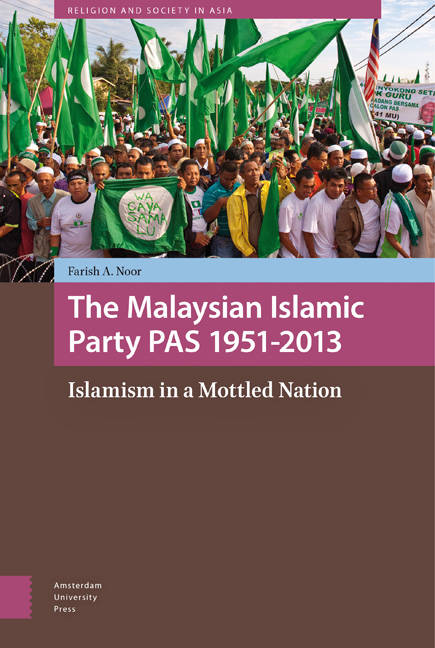Book contents
- Frontmatter
- Dedication
- Contents
- Introduction: Islamism in a Mottled Nation: The Story of PAS
- 1 1951-1969: The Orphan of the Cold War: An Islamic Party Steps on the Stage of Malaysian Politics
- 2 From Internationalism to Communitarianism: PAS as the Defender of Malay Rights: 1970-1982
- 3 PAS in the Global Islamist Wave: 1982-1999
- 4 The Jihad of the Ballot Box: PAS’s Democratic Experiment: 2000-2013
- 5 Religion, Politics, Islam, Islamism: What PAS Is, and What It Is Not
- Bibliography
- Index
2 - From Internationalism to Communitarianism: PAS as the Defender of Malay Rights: 1970-1982
Published online by Cambridge University Press: 12 February 2021
- Frontmatter
- Dedication
- Contents
- Introduction: Islamism in a Mottled Nation: The Story of PAS
- 1 1951-1969: The Orphan of the Cold War: An Islamic Party Steps on the Stage of Malaysian Politics
- 2 From Internationalism to Communitarianism: PAS as the Defender of Malay Rights: 1970-1982
- 3 PAS in the Global Islamist Wave: 1982-1999
- 4 The Jihad of the Ballot Box: PAS’s Democratic Experiment: 2000-2013
- 5 Religion, Politics, Islam, Islamism: What PAS Is, and What It Is Not
- Bibliography
- Index
Summary
Today when we look at the fate of the Malays we see that we have become like chickens that are dying of hunger in a field of rice, like ducks that are dying of thirst while surrounded by water. Our country is so rich, so prosperous, yet a large section of Malay society remains oppressed, neglected and left behind. Mohammad Asri Muda, Speech at the 17thPAS Congress, 18 June 1971
From Internationalism to Localism: PAS's Inward Turn in the 1970s
The demise of Dr. Burhanuddin al-Helmy brought to an end the ‘internationalist’ period of PAS, when the party saw itself as one among many Islamist movements worldwide that were working together in the spirit of postcolonial resistance against neo-colonialism and Western hegemony. That political Islam in Malaysia assumed this stance was hardly a surprise considering the availability of the vocabulary and discourse of Islam, and the fact that all across Asia the nascent postcolonial movements that had come to power were still busied with the task of undoing the mental, economic and political shackles of colonialism.
PAS in Malaysia was therefore not a unique phenomenon then, and its struggle was not a singular one either: from Indonesia to Egypt to Iran to Pakistan, Muslim societies were grappling with the dilemma of how to construct a postcolonial Modernity that was on the one hand modern and at the same time authentically local – at times couched in terms that were ethno-culturally essentialist and reductivist.
As I have argued earlier, PAS's failure to seize the state and to win over the support of the majority of Malayans was not entirely the result of the weaknesses of the discourse of Islamism per se, but also a reflection of the realpolitik of the time, shaped by external variable factors that were beyond the party's control. While the universal appeal and outlook of PAS's Islamism tapped into the collective aspirations of Muslims at home and abroad, it was unfortunately articulated in the context of a new and vulnerable nation-state whose borders were being challenged from its inception by hostile neighbours. Talk of fluid and porous borders is easy in the context of older, established states, but less so in the case of new polities whose borders were being violated by armed insurgents from neighbouring countries.
- Type
- Chapter
- Information
- The Malaysian Islamic Party 1951-2013Islamism in a Mottled Nation, pp. 67 - 112Publisher: Amsterdam University PressPrint publication year: 2014



